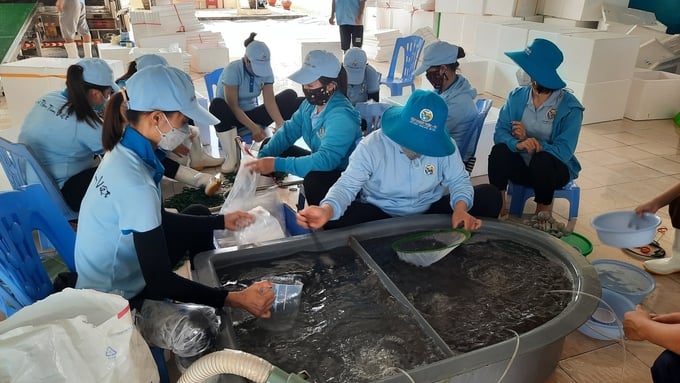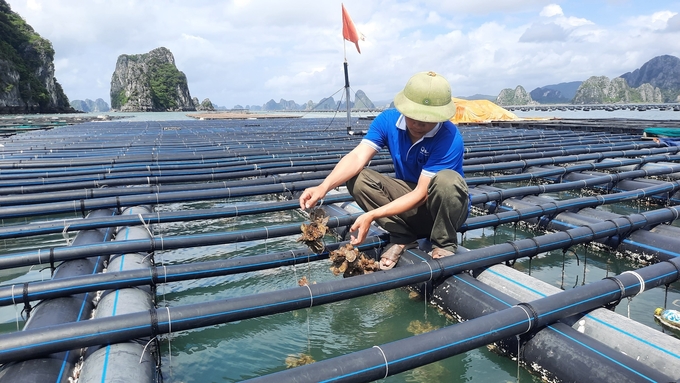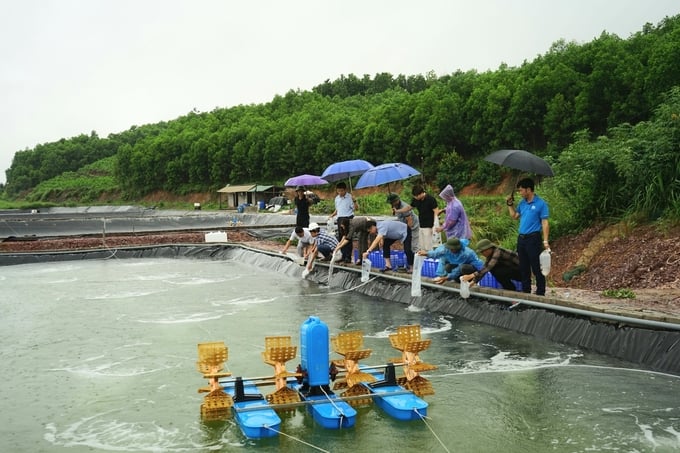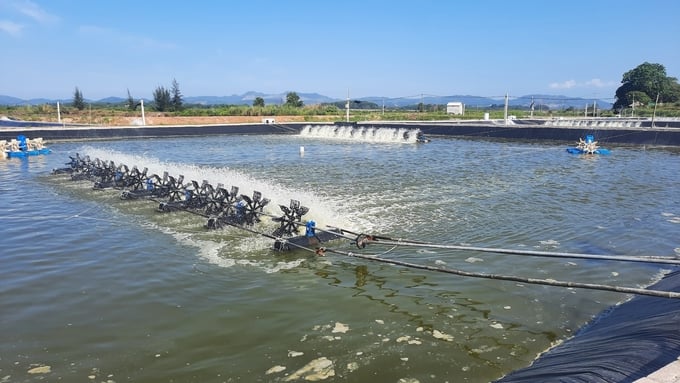May 21, 2025 | 02:06 GMT +7
May 21, 2025 | 02:06 GMT +7
Hotline: 0913.378.918
May 21, 2025 | 02:06 GMT +7
Hotline: 0913.378.918

An employee of Viet Uc Quang Ninh company packing shrimp seeds. Photo: Nguyen Thanh.
The fisheries sector plays a key role in agroproduction activities in Quang Ninh. With a marine farming area of nearly 40,000 ha, Quang Ninh is in high demand for seed, but the local seed supply capacity is still limited.
Quang Ninh Department of Agriculture and Rural Development has conducted inspections and granted certificates of eligibility to produce and nurture aquatic breeds for 16 establishments. Most hatcheries have a system of filter settling tanks, wastewater treatment, storage tanks, broodstock tanks, nursery tanks, etc. The systems are designed, arranged, and operated reasonably which guarantees the seed quality. But up to now the quantity of aquatic seed these hatcheries provide has only partially met the demand in the whole province (shrimp larvae 50% and molluscs only 30%).
The situation forces many businesses and farming households to import seeds from China or neighboring provinces and cities in the Northern region. This not only causes many inadequacies in quality management and seed quarantine but also poses certain risks, making the development of the province's aquaculture industry unsustainable. Also due to the prolonged transportation process and sudden changes in the environment, the quality of stocking seeds is low, difficult to ensure quarantine.

The source of mollusk seed is mainly imported from provinces such as Ninh Binh and Nam Dinh. Photo: Van Nguyen.
It can be said that being proactive in the quantity and quality of seed contributes significantly to the success rate in aquaculture. However, the production of seed sources on the spot is still not commensurate with the province’s existing potential.
Do Dinh Minh, Director of Quang Ninh Sub-Department of Fisheries, said, “We need to soon rearrange and reorganize small, scattered and fragmented seed production establishments, and apply scientific and technical advances to improve production efficiency. The direction is to form centers applying high-tech aquatic seed production and well organize the planning and establishment of concentrated seed production infrastructure.
Currently, for the Vietnamese shrimp industry, the linkage and cooperation between organizations and individuals in the shrimp value chain is still fragmented and ineffective, especially in small scale shrimp farming models. This leads to high production costs, reduced product quality and challenges in traceability.
Le Quoc Thanh, Director of the National Agricultural Extension Center, said: "Regarding the current shrimp farming industry in Vietnam, we have a very good fiscal space. Shrimp farming in a large area shows many positive signs. Many large enterprises have established product value chains, and Vietnamese shrimps have been exported to many countries around the world. However, there are still many small-scale shrimp farming households, and if we farm on a small scale while still applying the same outdated process, it will be difficult to compete in the international market".

Stocking white leg shrimp seed according to the joint production model in Cam Pha city (Quang Ninh). Photo: Nguyen Thanh.
According to Director Thanh, linking small-scale white leg shrimp farming households to form cooperatives will lead to unifying effective shrimp farming methods and good control of diseases especially in the water environment.
"If it is farming on a small scale without linkage, each family would use different types of seed, feed and environment treatment in different ways, thus spreading diseases on farmed shrimp. Therefore, linking small-scale farming households into one large-scale cooperative can solve the problem. We can form a value chain to apply the same process and treat the water environment together, thus overcoming the existing obstacles," said Director Thanh.
A well functioning model has the linkage of five units, including managers, scientists, farmers, suppliers (seeds, feeds, environment treatment products) and product consumption facilities. According to Nguyen Xuan Thang, CEO of Viet Uc Quang Ninh Co., Ltd., this partnership helps farming households stick together along the value chain from seed rearing, processing to exporting.

Small-scale industrial white leg shrimp farming models creating linkage along the value chain will help Quang Ninh shrimp industry develop sustainably. Photo: Van Nguyen.
Viet Uc Quang Ninh Co., Ltd has been building link chains, looking for opportunities and partners to help the development of the shrimp industry. As a seed supplier, the first link in the value chain, Viet Uc Quang Ninh will continue to provide disease-free seeds.
Farmers participating in the link chain model expressed their joy when the previously difficult problem had an answer. Ha Van Hao (Cong Hoa commune, Cam Pha city) said, "My family has been farming shrimp extensively for a long time, but it was not so effective as shrimp often died due to diseases. It is good to have this linkage model now because I am supported in terms of seed, drug, and water testing. I hope that shrimp will have a stable output soon".
Translated by Samuel Pham

(VAN) Japan's grant aid project contributes to capacity building, promoting organic agricultural production, and fostering sustainable community development in Dong Thap province.

(VAN) For years, the CRISPR-Cas9 genome technology has been reshaping genetic engineering, a precision tool to transform everything from agriculture to medicine.

(VAN) Vietnam aims to become a 'leader' in the region in the capacity and managing effectively soil health and crop nutrition.
![Reducing emissions from rice fields: [Part 1] Farming clean rice together](https://t.ex-cdn.com/nongnghiepmoitruong.vn/608w/files/news/2025/05/05/z6509661417740_a647202949c539012a959e841c03e1d3-nongnghiep-143611.jpg)
(VAN) Growing clean rice helps reduce environmental pollution while increasing income, allowing farmers to feel secure in production and remain committed to their fields for the long term.
/2025/05/19/5136-1-144800_230.jpg)
(VAN) The Nghe An Provincial People's Committee has just approved the list of beneficiaries eligible for revenue from the Emission Reductions Payment Agreement (ERPA) in the North Central region for the year 2025.

(VAN) 14 out of 35 domesticated elephants in Dak Lak province have had their living conditions improved, with 11 of them currently participating in the non-riding elephant tourism model.

(VAN) Muong Nhe Nature Reserve hopes that being upgraded to a national park will lay the foundation for forest protection efforts to be carried out in a systematic, modern, and sustainable manner.